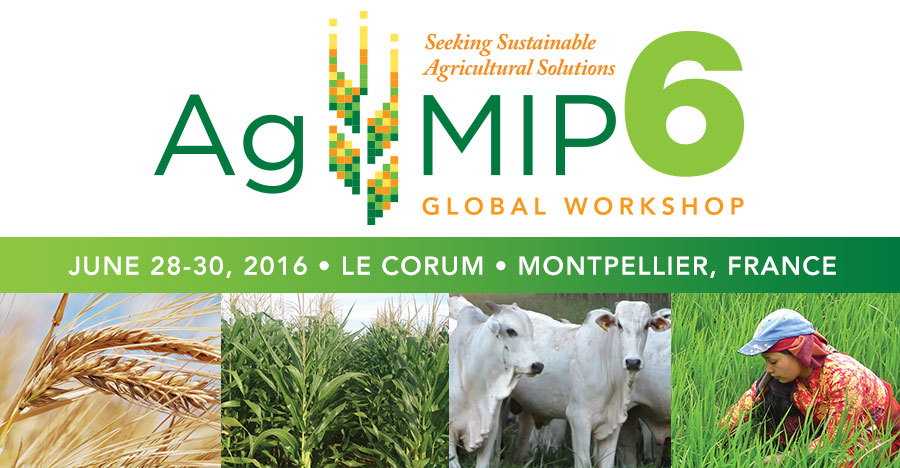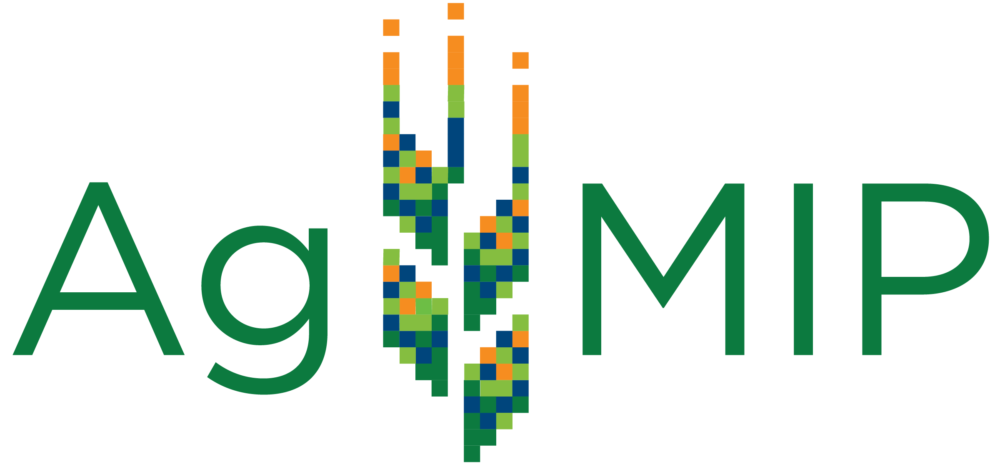
SUMMARY PROGRAM ABSTRACTS PRESENTATIONS
See below for links to available pdfs of presentations from the AgMIP6 Global Workshop and side sessions.
Monday June 27
Morning Side Sessions
European Impact Assessment (MACSUR/CROPM)
AgMIP Impacts Explorer
Coordinated Global and Regional Assessments (CGRA)
Afternoon Side Sessions
AgMIP RRT Session
AgGRID / GGCMI
AgMIP-Wheat & EWG WPCM Satellite Meeting
Tuesday June 28
Welcome and Overview
AgMIP6 Overview and Welcome
Plenary: Coordinated Global and Regional Assessments (CGRA)
Keynote – Mark Rosegrant
Panel – Jessica Fanzo
Panel – Mario Herrero
Panel – Hermann Lotze-Campen
Panel – Senthold Asseng
Parallel Session 1
1.1 Seasonal Forecasts and Climate Extremes
Past and future weather-induced risk in crop production – Joshua Elliott
Dynamic seasonal climate forecast driven probabilistic maize yield prediction over East Africa – Ronald Hutjes
Interdisciplinary and cross-scales agroclimatic assessment across The U.S. corn belt: what have we learnt? – Xing Liu
Forecasting effects of weather extremes: El Nino’s influence maize yields in Mexico – Gideon Kruseman
Integrated assessment of drought and adaptation scenario impacts on crop production in Austria – Hermine Mitter
Multiple crop model ensembles for improving broad-scale yield prediction with bayesian model averaging – Xiao Huang
1.2 Crop Model Improvement
Inter-comparison of crop models for simulating canola growth and yield – Enli Wang
Lessons learned from evaluating apsim and dssat maize model responses to carbon dioxide, temperature, water, and nitrogen – Ken Boote
Who has the ‘best’ crop model? – Senthold Asseng
Global gridded crop model evaluation: benchmarking, skills, deficiencies and implications – Christoph Müller
The uncertainty cross-cutting theme – Daniel Wallach
Parameterization induced uncertainty of the epic model to estimate climate change impact on global maize yield – Yong He
1.3 Development Adaptation Strategies
Developing adaptation packages for West African agriculture while ensuring congruence with climate and RAPs – Ibrahima Hathie
Designing and assessing adaptation strategies to face challenges of climate change: Insights from Indo-Gangetic Plains of India – Harbir Singh
Exploring adaptations to variable and changing climates for smallholder mixed crop livestock systems in semi-arid Zimbabwe – Sabine Homann-Kee Tui
Integrated assessments in irrigated agriculture linking crop and hydrological models: the case of central Chile – Francisco Meza
Developing and assessing adaptation strategies against climate vulnerability in cotton wheat cropping system of Punjab, Pakistan – Muhammad Ashfaq
Incremental crop management adaptations to climate change: an integrated assessment for European agriculture – Heidi Webber
1.4 Climate Change Assessments
Regional disparities in the beneficial effects of rising CO2 concentrations on crop water productivity – Delphine Deryng
Impacts of soil data uncertainty on crop yield estimates in a global gridded crop model – Christian Folberth
An integrated assessment of climate change impacts and adaptation in smallholder crop-livestock systems in Kenya – Lieven Claessens
Towards a 21st Century Climate Service for small-holder farmers in Zimbabwe: Definition of the climate problem – Elisha N Moyo
Economic analysis of climate impact and adaptation for the dryland wheat system in the US Pacific Northwest – Hongliang Zhang
Management outweighs climate change on affecting length of rice growing period for early rice and single rice in China during 1991-2012
– Xuhui Wang
1.5 Stakeholders & Decision Support
EUROCLIMA Biophysical Modelling, for policy support on agriculture and climate change in Latin America and the Caribbean – Maurits van den Ber
Impact of climate change on West Africa’s agriculture: a mid-century assessment of the major economic outcomes for smallholder farmers – Ibrahima Hathie
Nation-wide interdisciplinary assessments of climate change impacts on agriculture and food security – Hideki Kanamaru
Co-production of knowledge for agricultural adaptation: using climate information and crop model outputs in the wine industry and the maipo adaptation plan – Francisco Meza
1.6 Remote Sensing, Land-use, Scaling
Soil data aggregation effects in regional yield simulations – Holger Hoffmann
The AgMIP Coordinated Climate Crop Modeling Project (C3MP) – differences in climate response across 1100+ crop modeling sets – Alex Ruane
Integrated crop model uses remote sensing data to simulate crop growth and carbon flux data – Jonghan Ko
Using Earth observation and ancillary data sources as alternative to household surveys for regional integrated assessments for maize production in the Free state of South Africa – Wiltrud Durand
1.7 Wheat Model Intercomparison
Improved modelling of wheat processes through inter-comparison of multiple models – Enli Wang
Prediction of the rate of development and anthesis date using QTL-based parameters of an ecophysiological model for durum wheat – Pierre Martre
Designing wheat ideotypes for a changing climate – Mikhail Semenov
Model improvements reduce the uncertainty of wheat crop model ensembles under heat stress – Andrea Maiorano
1.8 Livestock & Grasslands
Large scale impacts of grazing management under climate change – Susanne Rolinski
Impact of climate change on the livestock component of mixed farming systems: modelling evidence from regional integrated assessments across sub-Saharan Africa and South Asia – Katrien Descheemaeker
Assessing simulation models for field scale projections of pasture GHG emissions and yields – Jean-François Soussana
Plenary: Co-Developed Research with Stakeholders (CGRA)
Keynote – Amy Sullivan
Panel – Wei Xiong
Panel – Boubacar Barry
Panel – Francisco Meza
Wednesday June 29
Welcome
Day 2 Welcome
Plenary: Modeling for Sustainable Farming Systems
Keynote – Patricia Masikati
Panel – Marc Corbeels
Panel – Rob Vos
Panel – Marco Springmann
Panel – Myriam Adam
Plenary: Next-generation Tools and Open Data
Keynote – Molly Jahn
Panel – Susan Capalbo
Panel – Joshua Elliott
Panel – Medha Devare
Panel – Sibiry Traore
Panel – Bruno Basso
Facilitator – Stan Wood
Parallel Session 2
2.1 Scenarios & RAPs
Developing National Representative Agricultural Pathways (RAPs) – Reflections, lessons and outcomes from high level stakeholder consultations in India – Nataraja Subash
Development of a Climate –Sensitive Representative Agricultural Pathways (RAPs) for West Africa: Stakeholder Interactions – Ibrahima Hathie
Developing Representative Agricultural Pathways: Experiences and Learning across four sites in India – Harbir Singh
Representative Agricultural Pathways for Europe – Anne Biewald
New methods for exploring future farms with stakeholders: the experience of AGMIP’s crop livestock intensification project in semi-arid Zimbabwe – Sabine Homann-Kee Tui
Process for the development of representative agricultural pathways for cotton wheat cropping system in Punjab, Pakistan – Muhammad Ashfaq
2.2 Nutrition and Food Security
Developing a value chain analysis framework to examine the health and environmental trade-offs of dietary patterns: A case study of the Mediterranean diet – Shauna Downs
Global and regional health impacts of future food production under climate change: a modelling study – Marco Springmann
Food System Metrics for Quantifying Nutrition and Sustainability Outcomes – Jessica Fanzo
Interactions between environmental change, agriculture, nutrition and health: an evidence-based framework – Hanna Tuomisto
An Income-Based Food Security Indicator for Agricultural Technology Impact Assessment – Roshan Adhikari
2.3 Biophysical Impacts of Climate Change
What would happen to wheat production in cotton-wheat cropping zone of Punjab under mid century scenario? – Ashfaq Ahmad Chatta
Climate change impacts on crop yield in Koutiala, Mali – Myriam Adam
Sensitivity of current spring barley production system to climate change – Davide Cammarano
Wheat yield potential in europe under climate change explored by adaptation response
surfaces – Roberto Ferrise
Towards Coordinating Assessments of Environmental Sustainability in Agricultural Systems for SDG2 – Sonali McDermid
Making climate data useful for decision makers at the local scale: the case of Nkayi district, Zimbabwe – Olivier Crespo
2.4 Soils & Crop Damage
Accounting for the legacy of soil and crop management when assessing climate change impact on crop production – Bruno Basso
Soil/land quality and health modeling within RASLEV framework in conditions of Russia agroecosystems – Ivan Vasenev
Pathways to Nitrogen’s Planetary Boundary – David Kanter
Impacts of crop rotation, extreme weather events, crop growth and residue management on soil organic carbon content – Anne Gobin
Modeling intercropping with cereals in smallholder agrosystems. From lessons learned in central Brazil to their application in the Peanut Basin in Senegal – Alpha Bocar Baldé
Soil organic matter and sensitivity to climate change. Can we disentangle correlation and causation? – Jean-François Soussana
2.5 Crop Model Improvement & Genetic Apps
Toward Next Generation Gene-based Crop Models: Implications on Experiments, Data, Modeling, and Modularity – James W. Jones
High-throughput phenotyping platform reveals genetic variability and quantitative trait loci of light-related parameters in maize models – Tsu-Wei Chen
A basic approach to predicting yields and optimizing inputs using artificial neural networks – Paul Koch
Importance of crop management for simulating crop phenology in large scale impact assessments – Ehsan Eyshi Rezaei
Assessing agricultural practices in highly variable environments: SARRA-H spatialized crop model for West Africa – Christian Baron
Improved functions for simulating crop water use are necessary to simulate the impact of [CO2] on maize yields – Jean-Louis Durand
2.6 Global Economics and Integrated Assessments
From SSPs to global RAPs – a conceptual framework – Hermann Lotze-Campen
Climate change stabilization and the global agricultural sector under alternative future development scenarios – Petr Havlik
Dynamic economic model of arable crop rotation – Ian McFarlane
Intensification and production reallocation: Attributing land-use changes to their underlying drivers – Thierry Brunelle
Alternative Futures for Global Food and Agriculture – Martin von Lampe
A simple recursive dynamic long-term agricultural sector model – Marcel Adenäuer
2.7 Regional Integrated Assessments
Climate Change Impact on the productivity of crops in smallholder systems in West Africa: The case of Navrongo, Ghana and Nioro, Senegal – Dilys MacCarthy
Reducing vulnerability to climate change in semi-arid Zimbabwe: a multi-model approach for redesigning smallholder farming futures – Sabine Homann-Kee Tui
Assessment of Climate sensitivity to present production system and evaluation of use of adaptation strategies to improve the livelihood security of small and marginal farmers of Indo-Gangetic Plains of India – A multi-crop-climate-economic modeling approach – Nataraja Subash
Evaluating Crop Models for Use with Economic Models in Integrated Assessment – John Antle
Future Climate Change and Its Effect on Maize Yields in Selected Semi-arid Areas of Southern Africa – Weldemichael Tesfuhuney
2.8 Information Technologies and Data
An integrated interdisciplinary modelling system of climate change impacts on agriculture in support of adaptation planning: MOSAICC – Hideki Kanamaru
The Akkerweb platform: models and data to support precision farming – van Evert
Enhancing Discoverability and Re-use of CGIAR’s Agricultural Data: Challenges and Progress – Medha Devare
DataMill: a new application to interface researchers’ database with crop models – Myriam Adam
Interlinked data and models using a semantic approach: an example of the RECORD platform in the context of the ANAEE-France project – Helene Raynal
Application of AgMIP data interoperability standards to the US National Agricultural Research Data Network for Harmonized Data (NARDN-HD) – Cheryl Porter
Plenary: Toward multi-national collaborative frameworks to enable coordinated global and regional assessments
Panel – Claire Weill
Panel – Alain Vidal
Panel – Terry Nipp
Panel – Heather Mckhann
Panel – Harry Clark (remote participation)
Thursday June 30
Welcome Day 3
Plenary: Steering Council Feedback
Keynote – perspectives from AgMIP Steering Council Co-Chairs Jean-Francois Soussana and Ghassem Asrar
Regional Breakouts
Regional Breakouts Report Back
3.1 South Asia
3.2 Sub-Saharan Africa
3.3 Latin America and Caribbean
3.4 North America
3.5 East Asia/Oceania
3.6 Europe
3.7 Global Agriculture
3.8 Global Economics
Workgroup Breakouts
4.1 Global Economics
4.2 AgGRID
4.3 Seasonal Estimates, Data Assimilation, and Climate Shocks
4.4 Regional Integrated Assessments
4.5 Crop Model Intercomparison and Improvement (various groups)
4.6 Data, Decision Support Systems and IT
4.7 Crop Modeling of Low-Input Smallholder Systems
4.8 Sustainable Nutrition Security
4.9 Crop-Water-ET
4.10 Livestock-Grasslands
Pest and Diseases Model Intercomparison
Friday July 1
Morning Side Sessions
Nutrition Group
Nicole Darmon
Fabrice DeClerck
Adam Drewnowski
Dave Gustafson
Marco Springmann
Hans van Meiji
AgMIP Soil and Crop Rotation Phase 2
Calibration
Afternoon Side Sessions
CGRA Part 2
Ozone Modeling

